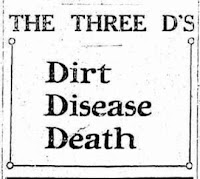The Great War: May 3, 1917
On May 3, 1917, it would still be two weeks before Congress would pass the Selective Service Act of 1917, but readiness and the need to build the country's military to fight the war in Europe was a frequent topic in the newspaper. The following article on the topic appeared in the Hudson Evening Register for Thursday, May 3, 1917--two columns over from this familiar but ominous reminder.
Before long selective conscription will be the law of the land and we will be prepared to begin the gigantic tasks incident to making America a modern armed camp. How prodigious this work is can be appreciated by only a few. The average mind cannot grasp the enormity of detail. Those who have read the article by Lord Northcliffe in the last issue of the Saturday Evening Post get an inkling of the problems
Early next month the selective draft will be in operation and millions of homes will realize something of what war means. Perhaps before the year has rolled around there will be 3,000,000 men under arms. Long before then there will be 2,000,000 in training unless by some unforeseen good fortune the Teutonic alliance should be defeated before our plans are well under way.
The passage of the conscription act means that the United States is in the world war in earnest--that we are to fight our own battles beside our allies and not ask them to do the fighting while we salve our consciences by egging them on with supplies of money and munitions. This is tragic business upon which we have embarked. It will be as tragic for us as it has been for Canada, no doubt. Fortunately the prosecution of this enormous and sad work will be carried out on a democratic basis--the basis of as just and fair a selective draft as out best minds could frame. We are prepared by the new law to begin the raising of an army on an efficient and just principle.
But our political and military institutions are going to get the acid test--and so is our manhood.
The article by Lord Northcliffe referenced above appeared in the Saturday Evening Post for April 28, 1917. Lord Northcliffe was the owner of the London Times. In the article, which was titled "Democracy Is a Bad War-Maker," he advised the United States not to make the same mistakes Britain and France had when preparing for war with Germany.
It is inevitable in war that peoples educated in the arts of peace, who have chosen as their leaders men as a rule more able in platform eloquence than in war organization, should suffer at the onset and until they have learned in the bitter school of experience. . . .
I notice from the perusal of American newspapers that you are making the same mistakes as the rest of us did at the beginning of the war: the mistakes of confusing energy and enthusiasm with organization; of imagining that war is an exact science like the administration of a string of factories or newspapers; of supposing that the voluntary worker is as valuable a human asset as the paid servant of the state.
After observing that "The ideal way of conducting a war would be to have at the head of it a dictator . . . but democracies do not like dictators," Lord Northcliffe makes, in his final paragraph, the following recommendation:
We in Great Britain have learned a great deal of what to do and what to avoid in the conduct of war by a democracy, by reading Nicolay and Hay's Life of Lincoln, which is more accessible and understandable than profounder and purely military studies of the Civil War. With close examination of what happened with you between 1861 and 1865, together with what happened in England and France between 1914 and 1917, I believe that you could save yourselves abundance of trouble and hasten victory for liberty that already looms on the horizon.
COPYRIGHT 2017 CAROLE OSTERINK




No comments:
Post a Comment